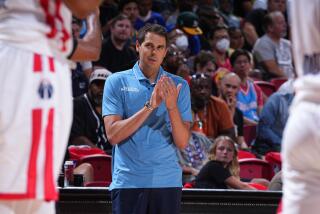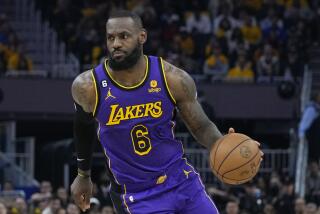D-Fenders Coach Casey Owens eager to lead Lakers’ D-League affiliate
- Share via
Last week, the D-Fenders named Casey Owens head coach of the Lakers’ NBA Development League affiliate.
Owens was an assistant with the D-Fenders for the 2013-14 season. Under then-coach Bob MacKinnon, the team finished 31-19.
Like the Lakers last season, the D-Fenders struggled to win games, finishing 17-33 under Phil Hubbard, who was not retained.
“When the D-Fenders decided to make a coaching change, we kind of rekindled our romance and lo and behold, here I am, moving back to L.A.,” Owens said to The Times. “I couldn’t be happier.”
Owens, who has also coached in the Continental Basketball League and overseas in China and Venezuela, decided to take a break after his stint with the D-Fenders.
“I ended up taking last year off to spend time with my family, watch my son play [high school] basketball in New Mexico,” he said. “I had coached 15, 16 straight years before that and I needed it.”
Recharged, Owens is looking forward to working closely with Coach Byron Scott and the Lakers, in preparation for his upcoming season with the D-Fenders.
“I’ll report Sept. 1 and we’ll get to work,” said Owens. “I know Byron a little bit from when his son [Lakers assistant] Thomas Scott was with us with the D-Fenders, but we haven’t met in an official capacity yet, because I just got the job.
“I’m looking forward to sitting down with Coach Scott, getting his terminology, his offensive and defensive philosophies so that when guys are assigned to us from the Lakers, or called up, it’s a more seamless transition.”
Though Owens will do his best to bring Scott’s system to the D-Fenders, the two leagues have different styles of play.
“What we’ll hope to do is incorporate his sets, his actions and maybe tweak them a little bit to fit the D-League better,” said Owens.
“The speed of the game is quicker, there are more possessions, because it’s a smaller league. Guys are tending to really try to shoot the ball as quick as possible,” he continued. “We’ll still play that faster, entertaining style of D-League basketball, but we want to be doing it with all the Laker terminology.”
Complicating matters is an uncertain roster. Players in the NBA Development League come and go quickly, some called up to the NBA, others leave to play overseas.
Casey said his personal experience and adaptability is a strength in the D-League, where the barometer for success isn’t always based on the team’s record.
“As much as I want this to be about my wins and losses, that’s really irrelevant,” Owens continued. “Every coach wants to win every game, but I’m there for the players trying to get them on to the next level, whether that’s a European buyout, whether it’s an NBA call-up, an NBA summer league invite, a vet camp invite. Whatever that is, that’s what they’re there for because no one is doing it for the money.”
With salaries maxing out at less than $30,000, the D-League is more of a steppingstone than a destination.
“The whole goal is to get them into a better place than they were when they started,” said Owens. “Guys turn down great money to go overseas because they’re chasing that NBA dream or they’re chasing a bigger contract in Europe.
“When we see guys get that, it really validates what I do. I look at it as I’m a teacher of the game, a leader, and that’s how I define being a coach, but that’s the biggest joy, moving guys on to the next level.”
Owens said the key to an NBA call up isn’t all about scoring prowess.
“All the D-League guys think, ‘I’ve got to go score 30 to get seen,’ but nobody gets called up to go score 30 in the NBA,” said Owens. “They get called up to defend, to hustle, to be a great practice player, to fill a role. We try to get that message across, that mantra, on a daily basis.”
Last season, the Lakers used the D-Fenders to get extra playing time for players like Jordan Clarkson, Tarik Black, Ryan Kelly and Xavier Henry. The Lakers also called up Jabari Brown and Vander Blue.
“It’s a huge tool for the NBA to be able to use, for the Lakers to send guys down for a few games and get work with coaches on the floor on their individual development, and then more importantly get those young guys time,” said Owens.
The Lakers start the 2015-16 season on Oct. 28 at Staples Center against the Minnesota Timberwolves.
Owens and the D-Fenders will hit the court when the D-League resumes in mid-November.
Email Eric Pincus at eric.pincus@gmail.com and follow him on Twitter @EricPincus.
More to Read
All things Lakers, all the time.
Get all the Lakers news you need in Dan Woike's weekly newsletter.
You may occasionally receive promotional content from the Los Angeles Times.






